Should Amish Buggies Have A Yearly Safety Inspection?
An interesting letter just appeared at Lancaster Online. An excerpt:
I have an idea for the state to make a chunk of change. Why not make the Amish register each of their buggies and have a yearly inspection and safety check, just like those of us with motor vehicles are required to do? I believe the buggies ruin our roads.
When I asked a state representative about this, I was essentially told, “Well, you probably wouldn’t want to travel at 20 mph.” And my answer is, “No, you’re right, but I also wouldn’t want to be riding in a plywood box up against a vehicle doing 50-60 mph.”
When I ask about the cost of repairs to our roads from their horses and wheels, no one will answer. There is no excuse, in my view, for some buggies to have metal wheels; they are very dangerous.
I just want to know why their rules and laws are different from ours. After all, aren’t we all in this together?
The saying “someone will only get away with what they’re allowed to” seems to fit here. Maybe we all should wear straw hats, because it seems like there is magic in them.
Terry Conrad
New Providence
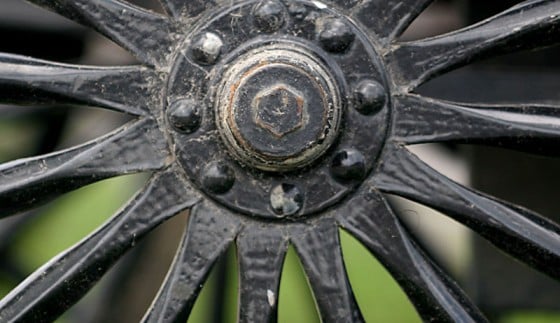
A few comments:
1. It’s unclear to me how metal wheels on buggies are “very dangerous“, unless he means that they are dangerous to asphalt, ie, they cause it damage…but that would be an odd way to put it. Seems hyperbolic.
2. The complaint about buggy road damage is a recurring one. It seems reasonable. It’s assumed that Amish buggy wheels can damage road surfaces. I haven’t seen much arguing against that, though the degree to which they damage roads, and in what ways, I don’t think has been thoroughly analyzed. I have heard that certain types of horseshoes can do more damage.
3. To the writer’s point, it also seems fair to expect some kind of compensation paid by regular users of the road, no matter the type of vehicle. In the case of motor vehicles, this comes in the form of gasoline taxes. After all, the Amish don’t buy gas, right?
Actually, the Amish purchase fuel as well, and thus pay this “road upkeep” tax. An Amishman in Ohio explains:
We do buy gasoline. It goes into our generator, lawn mowers, pasture mower, and into other things as mixed fuels (garden tiller, weed eater, chainsaw, etc.) During the winter we can get away with buying 8 – 10 gallons of gasoline a week at the local gas station, but during the warm parts of the year, that often doubles.
Ten to twenty gallons of gas per week is a pretty decent expenditure.
In 2017 there was a proposal that Amish buggies in PA should be registered and have license plates. The fee was to be $36 per buggy. It doesn’t look like that proposal came to fruition. Amish in other communities do pay some road upkeep charges, including annual buggy fees, or license plate fees (Indiana only).

Photo by Don Burke
4. The writer states that “I just want to know why their rules and laws are different from ours.” The Amish live very differently and in some ways are very different from most Americans. They do have different rules governing various aspects of life, which are guided in part by religious belief and in part by culture and tradition.
Here, at first look the rules appear to be one and the same for the Amish and the English: steel wheels are permitted and regulated by the laws of the state, as covered in the PA State Vehicle Code. However, that only applies to motorized vehicles – like tractors. The state doesn’t regulate the nonmotorized variety – in part to avoid opening a “Pandora’s Box”.
5. As to the idea of a yearly inspection & safety check…this seems mostly pointless, an unnecessary additional regulation.
It’s not like buggies are often having mechanical failure on the roads (“horse failures” appear to be much more common…). There is relatively little to inspect on a buggy, at least compared to a modern automobile with its countless onboard features. The Amish operators seem to do a pretty good job of keeping their simple vehicles in good-enough shape.
It appears the main issue here is not the roadworthiness of the buggies, but the damage they cause. That, and also…
6. The undertone of this letter is one of someone who sees the Amish as getting away with things that he wouldn’t be able to as an English person. A “magic straw hat” gets you special privileges in this view.
The state rep’s reported comment is sympathetic to the Amish. He seems to say, “they already have a tough time traveling at such slow speeds, it wouldn’t be fair to charge them”.
I think it is true that the Amish are generally seen as valued residents, and this might get them leeway in some areas. They bring in tourist dollars, and are usually considered good neighbors and a plus for local economies.
I smell an axe to grind here. Maybe it’s a general dislike of the Amish – or maybe it’s just a dislike of what he might see as the unnecessary expense and hassle of him having to go through an annual inspection. If the latter is the case, I can empathize.
At the same time, it doesn’t mean the writer doesn’t have a point about road damage and upkeep. Does the fuel tax Amish pay cover the actual damage created by buggies? Should horse-drawn vehicle operators here be charged in some additional way?


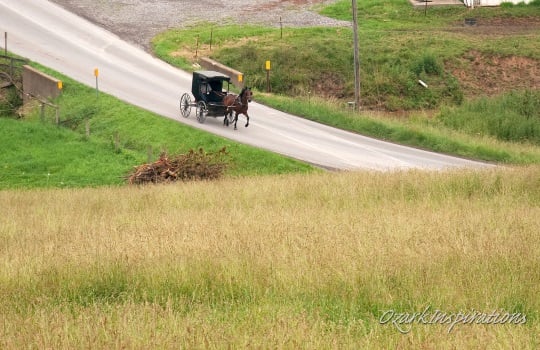
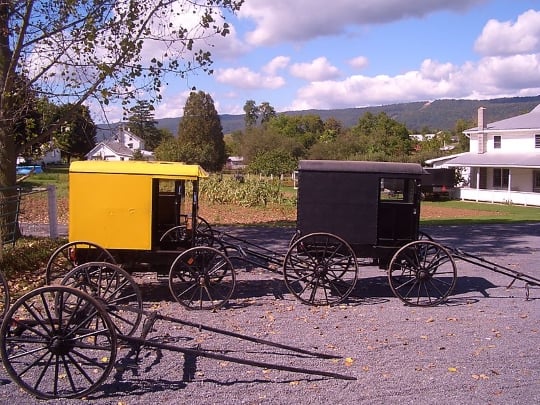

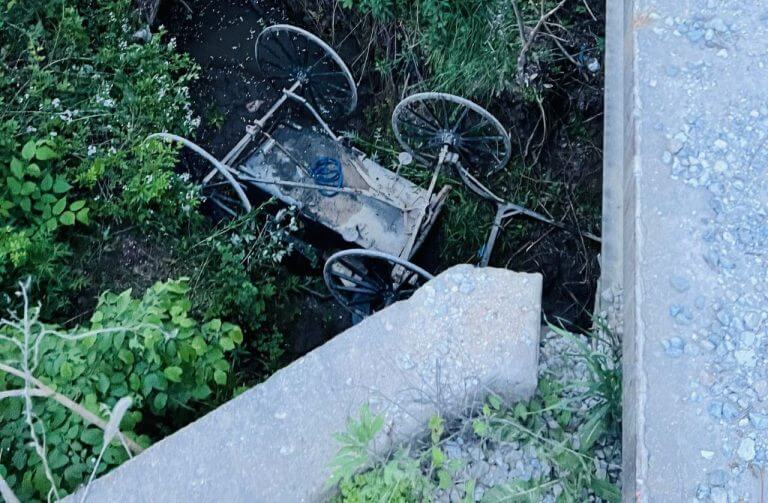
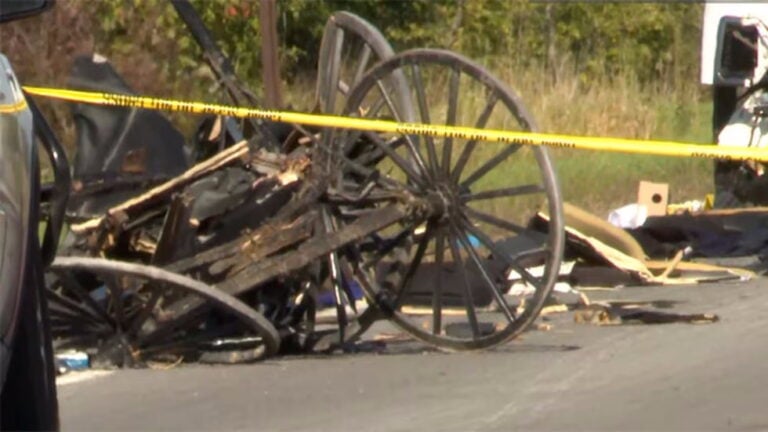
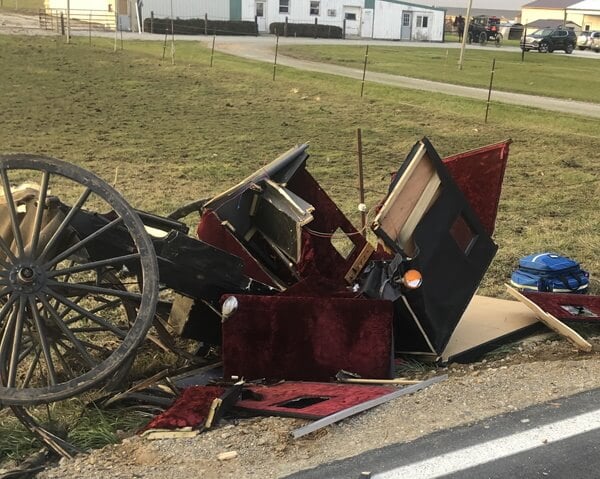
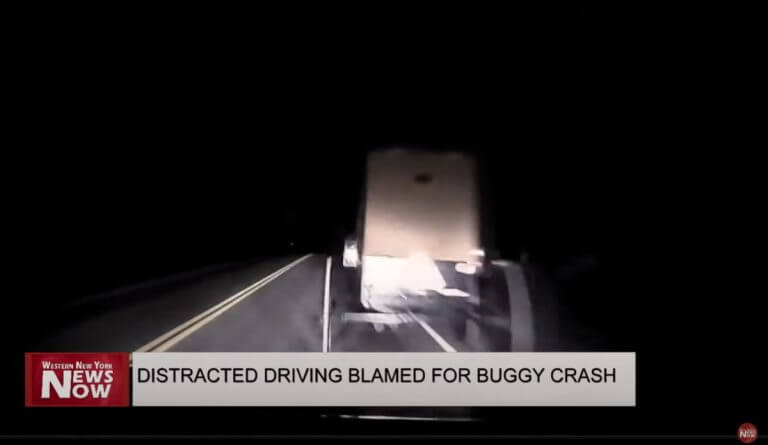
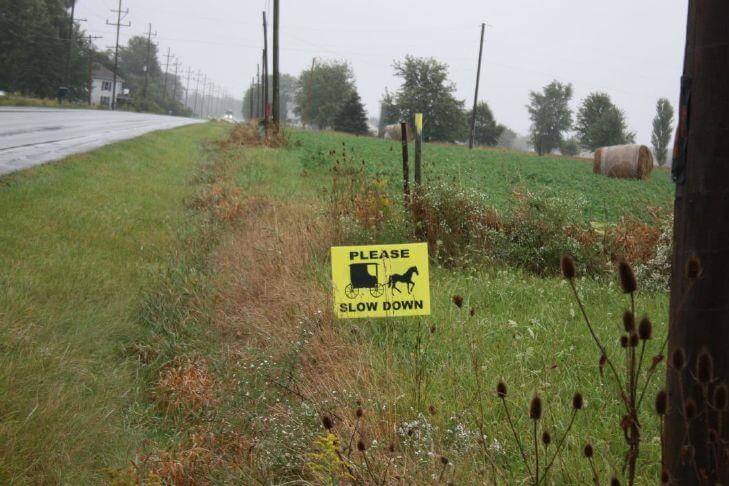
emissions
Of course buggies should be safe and while they are in for the safety check they should do an emission test too. Just sayin.
I think the writer of the original post should provide proof of whether and how Amish buggies/buggy wheels and/or horses’ hooves (presumably with the horse wearing metal shoes??) do that much damage to the roads. I think the freezing and thawing of the concrete plus the activity of infinitely more motorized vehicles than buggies on the roads give such roads way more wear and tear. I suggest if the OP resents the Amish somehow, perhaps he ought to get rid of his polluting vehicle(s) and start going around in a buggy–no gas or gas taxes to pay for and he would have a nice, friendly horse as a companion to look after; I think his complaining is just a lot of sour grapes. OP should be told that the more he complains the longer God will make him live.
This is ridiculous, if the government starts charging for buggies then what is stopping them from charging for bikes as well? Cars are harmful to the environment. Buggies are not.
au contraire
You obviously never stepped in buggy emissions. Just sayin.
I absolutely disagree with safety checks for Amish buggies!
But I do absolutely believe that motor vehicle folks need to be inspected
on their driving skills around buggies, we should be additionally tested to make sure we know how to drive the roads the Amish are on because obviously too many don’t!
Just sayin
roaj bugiy
I ABSOLUTE ARGEE THAT ENGLISH DRIVERS LEARN WHAT IT IS LIKE TO DRIVE A AMISH BUGGY wHEN HARASSED BY ENGLISH VEHICLE DRIVERS. English drivers will quickly understand how their actions cause a majority of the accidents.
Also, Semi trucks cause great deal of damage to roqds . MORE THAN AMISH BUGGIES.
That is well known.
I totally agree with you it is the cars that are Menace on the roadskoo
Das pferd
Pferden machen grosse schiesse auf strasse. Verstehen sie?
Buggy
That was not clever…..
Amish Buggies vs. English Attitudes
First of all, an “Eighteen Wheeler” is far more damaging to the roads than ANY buggy. So is rock salt.
Second, the bitterness in that article is palpable. How sad!
To Geo: Your ridiculous attempt to comment in German is highly insulting!
1. Plural of das Pferd=die Pferde, no final -n
2. Scheiße sagt man nicht. Pferdemist heißt das, was dieseedlen Tiere hinterlassen!
Werde endlich erwachse, und LERNE eine Sprache, bevor du schreibst! Du hast dich hier lächerlich gemacht!
May I suggest a laxative or perhaps a sense of humor transplant?
Country roads
Nobody should be going 50-60 on those winding two lane roads, so yeah, it’s unconvincing, on several points.
Do Amish take the buggies on the freeway? Down here on the Tx-Mexico border, there were always signs in English and Spanish warning not to take horse drawn vehicles onto the freeway.
Amish Persecution
There are so many things wrong with this suggestion… but mostly it’s a case of Amish persecution. Why single them out? I too “smell an axe to grind.”
I suspect the Amish wouldn’t be disappointed if the roads weren’t paved–it would be easier on the horses and slow traffic, perhaps reducing accidents.
You also don’t see the Amish asking why our rules aren’t the same as theirs. They appear to be much better at living among us than we are living among them. We could learn a lot from them. We are not all in this together (whatever “this” is) but we do need to live together.
Right on! Well said!
Amish provide a lot of tourism for a state….so when you can do that car driving moron who is complaining then maybe you get a free ride too! Also the gov’t doesn’t have to provide them with jobs they create their own versus you car driving moron who probably works a gov’t created could easily be automated useless job that taxes and fees go towards…
The buggy saga
There have been issues for years for communities that have Amish living close by. In my hometown area the Amish moved in in the early 1960’s. The English drivers were so afraid they were going to cause an accident due to black buggies on the road, on a black night,, with only a red globed side lantern to make their presence known. They brought this concern to the bishops that a slow moving sign would be a good thing to have to keep them safe. I forget how long it took to get the ok from the bishops, but they finally agreed. Then there was a move for the reflector tape, and progress was being made.
When they came to town where they parked was another issue. Horse manure would build up, and the locals complained. It came down to who’s responsible for the clean up.
Erik, you know how I like to rattle on, so I’ll just stop right there! Ha!
Have your Wisc visit on the to-do list yet?
Joy for your day,
Terry
https://www.wisfarmer.com/story/news/2020/01/08/law-would-require-horse-drawn-buggies-pay-share-road/2839129001/
Interesting account Terry. I understood it to mean that it was an informal initiative of non-Amish residents rather than something driven by local government/law enforcement that brought about change. Nice to see things handled that way if that was in fact the case.
It’s always on the list but good of you to keep it front of mind. If in that general area of the country I would also have to visit NE Iowa where I once lived for a summer and the Amish in southern MN. So you can see your seed planted is beginning to grow into a more concrete idea here:)
Metal wheels
Last year while visiting the Arthur, IL, Amish community, we (and about 17 others) had lunch at an older couple’s house. I asked to see their buggy. I noticed that their metal wheels had rubber rims, about 1” thick. The woman said that is what their ordnung allowed. She also said it made for a quieter ride. Obviously, this district is a lot less strict than many of the districts in PA.
I am a little surprised that more churches don’t permit rubber on the wheels. Others that do are New Order Amish and at least some of northern Indiana. Not sure the current situation among Old Order in Holmes County, but as of several years ago sounds like they were not seen anywhere in that group.
Geo
nije pristojno govoriti u odeljku za komentare, a drugi to ne razumeju, zar ne?
Jeste. Ali bio sam u Amiškoj crkvi a propoved bio na Nemačkom. Ništa nisam razumeo!
Geo
I responded in another language only to prove a point.
As we have dialogue in comments (which I enjoy, am enlightened)
I ask may we please keep it to one language we all understand
so we may all participate. Unless the intent was not to include me.
My mother spoke 7 languages and would never
speak one if a person did not understand.
Just sayin
Dietsch
Dietsch sprechen, bitte.
To answer the question...
… should the all U.S. citizens be required to contribute their fair and equal share to the society we all enjoy? Of course!
That’s actually a different question than what’s presented in this post, though I’d agree in principle with your answer to it. The problem usually comes in defining “fair and equal”.
Unless recent experiences have shown the buggies to be unsafe and thereby the cause of accidents, a safety inspection is arguably not needed. Period. If the Amish are not paying their due portion of upkeep for roadways (and that has not be shown to be true in the information presented here), then other means more fitting to the situation might be considered. But as it stands here, no due justification is shown, and it only sounds like someone with an axe to grind.
I wish the English world would just leave us alone we do pay taxes and we are very careful with our buggies on the road it’s the drivers that are in cars that are not careful
We kill more of them than they kill of us!
Here in Indiana rubber wheels are mandated in some places. Yes, the buggies can be flimsy, but even broken down they take up not much more space than a car with a flat tire. I think more dangerous is the sometimes exhausted horses I see stumbling and seemingly out of control. They need to be careful of their horses and sometimes I don’t see the care that I would think should be exercised. Regardless, it is up to US to drive carefully. Horses get spooked, buggies lurch, cars speed, kids are driving the buggies sometimes, and all of that adds up to the fact that we kill more of them than they do of us. So be careful!
make them pay taxes
They already do.
Bonjour,
Autrefois les chevaux de calèches en France ne vivaient pas longtemps à cause de l’asphalte et des vibrations des sabots sur la route. On les changeaient régulièrement. On devrait faire des pistes pour “poussettes” avec de l’herbe, cela serait plus agréable pour les chevaux et le fumier se résorberait dans le sol.
Un cheval qui est sur l’asphalte ne peut pas être sans sabots métalliques, il en a besoin.
Les Amish ne pourraient pas vivre en France car les lois sont faites pour tous les citoyens sans distinction et on ne peut pas contourner la loi qui se veut laïque. Même si beaucoup de gens aimeraient vivre en autarcie, ils ne le peuvent pas légalement.
I see GEO is still so teasing! …
I just notice that in America it’s like here in Europe, thirty-forty years ago, when a horse dropped a big pile of Schiss on the road, people were quick to pick it up with a shovel to put it in his garden. Nowadays, they prefer to go to the garden store to pay a fortune for a bag of chemical fertilizer!
To drive or be a tumbrel passenger fairly regularly, I actually find that the rubber wheels as Joe talks about, are much more pleasant for the passengers (less noise and the holes in the road less hard to take).
To remain caustic with the opponents of this mode of travel, we have forgotten that the horses let go of the winds which are often subject to laughter for the passengers of a buggy, but which by their methane contribute to global warming, while their pick- up its certainly carbon neutral.
Sylvie, je dirais, tout est possible, tout est réalisable! On peut toujours contourner la loi si l’on veut. Sur les hauteurs des Vosges(sans doute aussi dans le Massif central) je connais assez d’originaux qui arrivent à vivre “hors normes”. Effectivement ils sont pris pour des originaux ou des écolos engagés à fond, mais ils y arrivent. Et deviennent de plus en plus des modèles pour d’autres.
A Romain
Bonjour Romain,
Je suis bien contente d’avoir un commentaire francophone…J’habite aux pieds des Vosges en Alsace et je vous avoue que je n’ai jamais rencontré des gens un peu en marge du système. Il doit y en avoir mais je ne sais pas comment ils font……..Je pense qu’isolément cela doit être possible mais toute une colonie, je doute, bien que…on commence bien à voir des éco-villages. Je pense que de plus en plus de gens aspirent à un autre style de vie. On voit maintenant des tiny houses, des yourtes, toutes sortes d’habitats alternatifs. J’ai suivi pendant quelques années les tiny houses. La plupart des gens y restent deux ans en moyenne avant de changer de projet ou de retourner dans le système.
Les Amish sont un exemple pour moi à bien des égards.
Sylvie
Sylvie
J’habite également sur le piémont vosgien côté alsacien.
On a quelques spécimens que je connais et que je découvre encore de temps en temps sur certains petits marchés locaux alors qu’ils vendent leurs produits. On est loin du style amish, mais plutôt “post hippie” je dirais. Certains tiennent plus que deux ans, si ce ne sont pas des néo-ruraux qui se lancent tête baissée. 😀
Si vous souhaitez en apprendre plus sur nos heftlers locaux (noms donnés aux amish lorsqu’ils habitaient encore chez nous) Erik publie mes petits articles que je fais sur ce site. J’ai déjà écrit au sujet du hameau de Salm article paru le 28 août il me semble. Je viens de terminer un sujet sur le hameau voisin des Quelles, il ne restera plus qu’à Erik de le publier. Suivra un article sur la prairie du Hang et j’ai bien d’autres lieux en Alsace qui suivront…
Buggy Inspections
I bet buggies are inspected more often that you think! My grandfather built a buckboard wagon in the early 1970’s. We used it several times a week around the farm, bringing vegetables to the grocery store, and to the post office,etc. He also trained horses (an riders). He never left without inspecting the wagon and all harnesses. Things can loosen up on a bumpy country road. I’m sure the Amish know this too and all children grow up learning to check things also. The buggies are probably inspected way more often than our cars. All passenger vehicles and commercial trucks have a checklist in their log books that must be filled out before leaving for the day. I know this from experience.
Well put, that’s also what I had in mind.
Buggys
Sounds like this person is quite uninformed and a bit of a religious bigot.
Romain
A Romain,
Bonsoir Cher compatriote Alsacien. Je serais vraiment intéressée de lire vos articles. Je parlais des gens qui vivent en tiny house, ils y vivent en moyenne deux ans et passent à autre chose.
Pour les néo hippie c’est autre chose.
Mes grands parents avaient une ferme auberge autrefois “la Neumatt” à Wildenstein, peut-être vous connaissez. J’ai encore de la famille qui ont des fermes auberges du côté de la vallée de Munster à Soultzeren.
Mon grand-père faisait de la schlitte et était aussi grumier.
Sylvie
Pour lire le premier article, voici le lien https://amishamerica.com/amish-history-anabaptists-salm-alsace/
Pour les suivants, le mieux serait de surveiller régulièrement les articles qui paressent sur ce site.
Effectivement, on peut vivre en marge du système dans une vieille ferme, mais de là à vivre en tiny house ou en yourte, c’est déjà autre chose. Ca ne m’étonne pas que beaucoup ne tiennent que deux ans.
Je connais assez peu le coin entre Thann et Wildenstein, mais beaucoup plus la vallée de Munster.
Chapeau à votre grand-père et tout ceux qui ont eu une schlitte avec son chargement dans le dos. Chaque descente pouvait être la dernière…
Romain
Nous avons de la famille dans la vallée de Munster, à Soultzeren, SCHUBNEL Raymond, il a une ferme auberge.
J’ai déjà vu un petit reportage sur ce site avec de très photos ainsi qu’une très belle maison ancienne en pierre anabaptiste. Peut-être que c’était le vôtre.
Mon grand-père a un jour perdu un cheval de trait dans un ravin. La schlitte s’était très dangereux, mon grand-père n’était pas grand mais il avait des mains et des avant-bras énormes.
Il a travaillé dur toute sa vie et nous avons tout perdu. Il est mort jeune d’une crise cardiaque et ma grand-mère a vendu la ferme et les terres pour rien. Elle a été racheté puis revendue il n’y a pas très longtemps à un Suisse pour 580 000 euros. Jamais nous ne pourrons racheter ce bien c’est ainsi…
Lets see:
Cars are faster and heavier. Therefore more dangerous than buggies.
Cars/trucks do more damage to the roads than buggies.
Salt used in the roads in winter can damage the roads and environment.
Weather (heat. Cold. Rain. Ice. Snow) does More damage to the road than buggies.
Cars destroy the environment more than buggies.
Amish don’t need paved roads. Cars do. In fact, Amish got around in buggies long before roads were paved.
Also, Amish do pay for gasoline. So they do pay that tax to repair roads as the story above noted. Generators. Chainsaws. Etc.. When they use Amish taxis, they indirectly pay that tax as well.
Some people just want to complain. Ignorance can make people that way.
JOB
Agreed, couldn’t have said it better myself.
Job 34:35
Damage roads/inspection
A lot of tourist just come to certain areas to see the Amish and buy their products. Without them a lot of businesses would be hurting. They do more good then their buggy wheels do damage to the roads. No I don’t think they should be inspected. I do think they should have lights and reflectors.
Lights and reflectors
Lights, eh No
Reflectors, ah Yes
Let’s not destroy the majesty of the buggies and horsies
by putting lights on em making them look like cars.
I just can’t visualize that….wouldn’t want to.
Respectfully
Just can't
Just can’t visualize and wouldn’t want to because of the majesty of the buggies and horsies…
What about the majesty of the lives lost on a curvy, hilly, road at night? Are those lives worth sacrificing so you can enjoy the majesty of the buggies and horsies?
Come on, people, these are SAFETY ISSUES.
I like how they call it a “plywood box” like their plastic death box which kills 40,000 people a years and causes billions in damages and thousands of injuries is not exactly safer. The buggies themselves are too slow moving to cause any real damage with faulty parts, even traveling at their max speed of 15mph. The real culprit of 97% of Amish buggy accidents are motor vehicle drivers driving at excess speeds on windy roads and often intoxicated.
Next they’ll want to inspect other bicycles to make some extra money.
Safety issues
Joni Joni Joni
Tsk tsk
Who said anything about enjoying them although I think they are beautiful, yes indeed in all their majesty and should be let be.
Sacrificing lives ?! I’m first surprised and then aghast at the statement.
It’s a no brainer, we all share the road and drive what we drive. I drive my truck differently when I’m around motorcycles, always giving them the right of way.
Folks in vehicles need to do the same for buggies and horsies or get urself off the road and walk. Maybe hitch a ride from the buggie, they just might oblige.
Sincerely
Amish Buggies
I believe if some of you were to actually talk with the Amish, you would find that they check their buggies on a regular basis. They have no desire to have an accident when using their transportation. As to the roads, heavy car & truck traffic, along with freezing concrete and salt do more damage to roads than a buggy will.
You just do not want other people to be different from you. I admire the
Amish for a different way of life.
Nope! Should not be required of any vehicle. Makes no difference on safety between states that require and don’t.